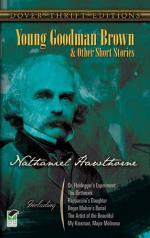|
This section contains 3,215 words (approx. 11 pages at 300 words per page) |

|
SOURCE: "Hawthorne's 'Young Goodman Brown': Cynicism or Meliorism?" in Nineteenth-Century Fiction, Vol. 14, No. 1, December, 1959, pp. 255-64.
In the following essay, Miller contends that Goodman Brown is not meant to be representative of all humanity, and therefore Hawthorne's story is not as pessimistic as is commonly perceived.
Critics have agreed that Young Goodman Brown, in the course of the Hawthorne story of the same name, moves from a state of simple faith in God and his fellow man to an evil state involving damnation, or at least soul jeopardy. They have also generally implied that as well as being an individual, Young Goodman Brown is in some sense intended to be a type. They have not generally indicated, however, whether they think he is intended to typify all mankind or only one segment of it. This question is important, it seems to me, because on the answer one gives...
|
This section contains 3,215 words (approx. 11 pages at 300 words per page) |

|


